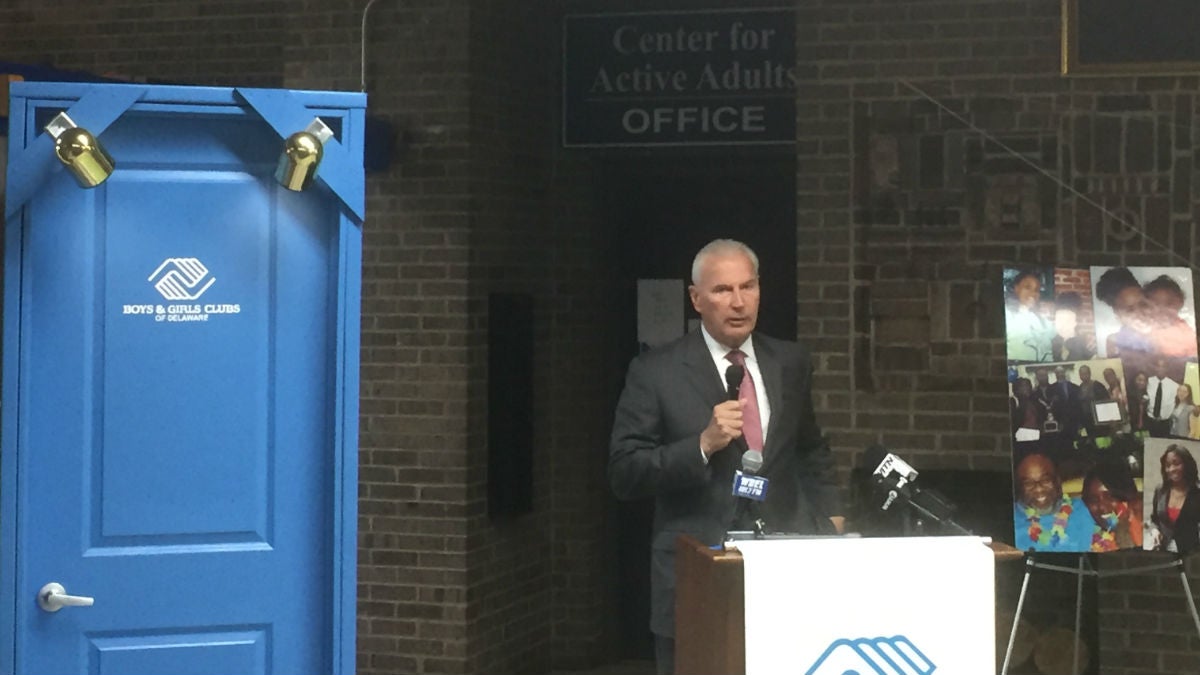Boys & Girls Clubs using program to improve youth-police relations

Mayor Purzycki praises the Just(ice)program. (Zoe Read/WHYY)
Boys & Girls Clubs of Delaware are using a program to help youth and police connect.
Young black men and teens and police officers in Delaware are putting their differences aside, and learning how to better understand each other.
The meetings are part of an effort by Boys and Girls Clubs of Delaware to improve relationships between police and youth, and decrease violence through a program gaining momentum across the U.S.
Now the organization hopes to expand the lessons learned in that program, known as the Just(ice) in Time Training Seminar for Teenagers & Young Adult Males of Color.
“Too often we see….the senseless loss of life involving young people and law enforcement,” said Tyrone Perry, a Boys & Girls Club statewide coordinator for Just(ice) in Time.
“Just(ice) in Time training is a life skill and potentially lifesaving training program designed to educate young people about legal rights, and to arm them with intervention strategies so they can positively interact with law enforcement.”
Snell & Associates Consultants of Buffalo Grove, Illinois, developed the program in response to youth violence across the country.
The seminar utilizes real life situations and experiences and reverse role play to educate young people between ages 13 and 26 on how to interact with law enforcement to increase positive outcomes.
“You really start to personalize police officers as individuals as humans. Sometimes we expect them to be a uniform or a stiff. You come away with Officer X is a father and he really cares about the community, and they’re good people behind it all,” Perry said.
“It really allows for bridges to be built between law enforcement officers and our city community.”
Since 2015, Boys & Girls Clubs of Delaware has hosted two youth events involving about 127 youth and one training session for police officers and community leaders.
Perry said he believes the training sessions have improved community-police relations in Wilmington. When Jeremy McDole was killed in his wheelchair during an officer-involved shooting in Wilmington in 2015 the community expressed outrage with police. Perry said a heated protest was diluted because a police officer and one of the protest attendants had received Just(ice) training together.
“There’s a bit of a rapport and a respect factor,” he said.
Now Boys & Girls Clubs of Delaware are hosting events that educate youth and community members to be facilitators and educators. On Thursday from 9 a.m. to 3 p.m. the Greater Dover Boys & Girls Club will host a Train the Trainer event. The club also will host a regular seminar on May 13th.
“So, they will take what they learned and they will do it on their own, so the Just(ice) in Time message becomes part of the fabric of the community, ultimately helping young people make better decisions, build better relationships with law enforcement personnel and creating a true blue integrated community policing effort,” said John Wellons, president of Boys & Girls Clubs of Delaware.
Wilmington City Council President Hanifa Shabazz, D-Wilmington, said she believes the program aligns with CDC recommendations to put in place youth positive development programs in order to reduce violence. She also said the program will teach officers and youth to be “bilingual” speakers—knowing the difference between colloquial language with friends and how to communicate with authority figures.
“It will be a great asset to us deterring violence, because it would not only teach young people how to deal with police officers, but also teach them how deal with each other,” Shabazz said. “This conflict resolution they have, or ‘beef’ as you would say, with each other, and how do they deal with that in a non-violent way.”
New Wilmington Police Chief Robert J. Tracy and Mayor Mike Purzycki, D-Wilmington, said the program is compatible with their efforts to ensure all police officers are community police officers.
“It reaches out to the community and says, ‘You matter, you’re respected, you have value—we have to work together.’” Purzycki said.
“We have great cops—you just have to get to know them. And when you do, people start to think of each other less as young people who commit unfortunate and bad things and police who have a reputation maybe they don’t deserve.”
WHYY is your source for fact-based, in-depth journalism and information. As a nonprofit organization, we rely on financial support from readers like you. Please give today.





